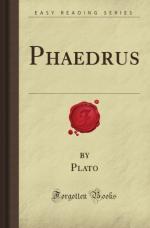|
This section contains 7,600 words (approx. 26 pages at 300 words per page) |

|
SOURCE: An introduction to Babrius and Phaedrus, Harvard University Press, 1965, pp. lxxiii-xlvii.
In the essay that follows, Perry surveys the autobiographical information gleaned from Phaedrus's poetry, as well as major stylistic issues of the fables, particularly the innovations Phaedrus contributed to the Aesopic tradition.
According to the testimony of the principal manuscript P, in which his fables have come down to us, Phaedrus was a freedman of the emperor Augustus.1 Everything else that can be known or surmised about his life and personality must be inferred from what he himself, a very self-conscious author, tells us in his own book, whether explicitly, or in passages of doubtful meaning, or by innuendo. The detailed accounts of his life drawn up by equally painstaking scholars on the basis of these heterogeneous data vary widely from each other, according to how much is deduced from ideas implicit in the fables themselves...
|
This section contains 7,600 words (approx. 26 pages at 300 words per page) |

|


